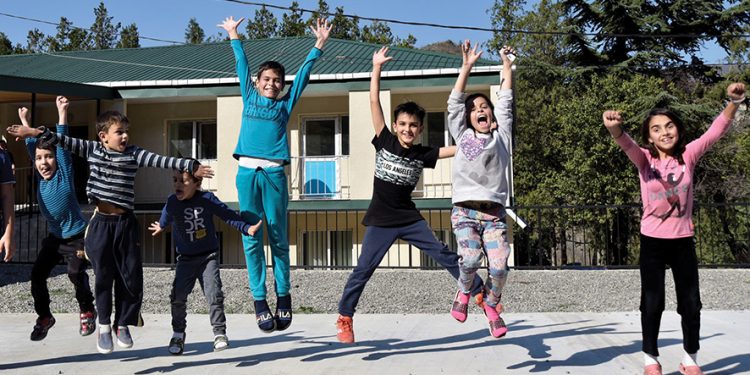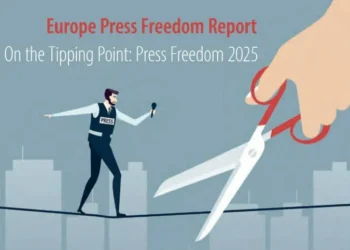American Friends of Georgia (AFG), a non-governmental organization (NGO), is to celebrate 30 years of charity work and friendship with sponsors and partners through their annual gala on May 18.
The organization was established in 1994 by an American lawyer with Georgian roots, Constantine (Connie) Sidamon-Eristoff, to help children and elderly people throughout Georgia. The Executive Director of AFG, Lena Kiladze, has held her title since the Georgian office opened in 2006. She says the gala is held once a year and is their biggest charity event to promote social giving and engagement in society.
“It is always unique, because it unites people, and this time we have a wonderful group of people, our long-time partners, and supporters,” says Kiladze. “It’s basically an evening of friendship.”
She notes the proceeds from the event will go toward supporting two focus projects, the first one being the Dzegvi Shelter outside of Tbilisi. What first started as an orphanage in 1995, is now a community that has housed more than 100 street children, single mothers, elderly people, and those with disabilities. Kiladze says AFG wants to restore this community by adding greenhouses, reconstructing buildings, and encouraging social and business activities for the residents.
The second focus project is Hospice and Palliative Home Care Projects. Kiladze tells us this is the first hospice program in Georgia that offers a free nursing school and home care program. She says it helps more than 100 elderly people with palliative home care by providing them with medicine and attention that’s needed during the last stage of their lives.
In addition to the proceeds from tickets at the gala, there will also be an auction, to which prominent Georgian artists have donated their works. Those attending the event can expect a dinner, reception, and live music from the world-famous jazz trumpeter, Chris Botti. Kiladze notes they are very excited to have Botti, who will be visiting Georgia to exclusively play at their charity event.
“It’s the 20th anniversary since the first time he came to Georgia,” Kiladze tells GEORGIA TODAY. “He is very happy to be back here, so it’s kind of like his friendship with Georgia, AFG, and our board members combined.”
In the 30 years that AFG has been around, they have supported more than 70 projects across the country. Kiladze says their work can be put into different categories: They support former street children, those with disabilities, children with tuberculosis or leukemia, promote children’s inclusion, and more. In the beginning, she says, the focus was street children because the numbers were high in the 1990s.
Then, several projects were made over the years with those who have disabilities. Eventually, and still today, the focus shifted to helping children who had been diagnosed with tuberculosis and leukemia because, according to Kiladze, there wasn’t a cure for it at the time. AFG created the first and only Parents House in Tbilisi that gave a place for children to stay while they underwent chemotherapy treatment. Kiladze says this was the only hospital that treated children with the illness.
“Disability was a big problem, and still is, because there’s a certain stigma in Georgia, especially in the villages,” she says. “Sometimes, people had no idea that a family had a child with a disability because it was a shame to mention it, so we did a lot of work dealing with those issues.”
AFG also assisted in helping internally displaced people from the Russo-Georgian War in 2008. Kiladze says they built an Art Education and Rehabilitation Center in 2010 with the Embassy of Japan that helped over 115 children a year who had been traumatized by the war. The kids lived near Nikozi, which is next to South Ossetia, where Russia left bombs.
According to a report from AFG, 1,050 children have benefited from this project since 2010. Additionally, there was a War Relief Fund created by AFG in 2008 which helped over 1,700 internally displaced people from South Ossetia.
Another area Kiladze says the organization heavily focuses on is education. They assist in giving stipend funds and computers to children in remote villages, so they have the chance to study. They also aim to teach youth about cultural preservation and support Georgian craft production in remote villages.
“We think what’s most crucial for Georgia is a change in the level of education. That’s why most of our projects are related to this topic,” Kiladze explains.
Kiladze first got involved with AFG because of her life in the 90s. She says she worked as an architect, but it was hard not to pay attention to the societal needs around her. She explains how she felt a social responsibility at the time to do whatever she could to help people.
She had friends and knew people who had begun working with children, so she slowly got involved with programs and started raising money. She explains how the people she was helping were also helping her by letting her create something wonderful with them.
“You can’t live in a bubble and pretend nothing is happening. There are people around you who enrich your life,” she says. “I don’t know who does more; maybe they do more for me than I do for them.”
Kiladze expresses how grateful she is to have relationships with people around the globe who want to help and support those in Georgia. She says it’s amazing how there are people who have never visited her country before, yet they are still willing to contribute. Kiladze says this is why friendships and relationships between people are everything.
“We never tried to advertise very much what we are doing, but it’s amazing after 30 years to be able to mention so many wonderful people, so many wonderful Americans, Georgian Americans, and Georgians, who have been very quietly supporting the cause and these vulnerable groups,” she notes.
By Shelbi R. Ankiewicz














